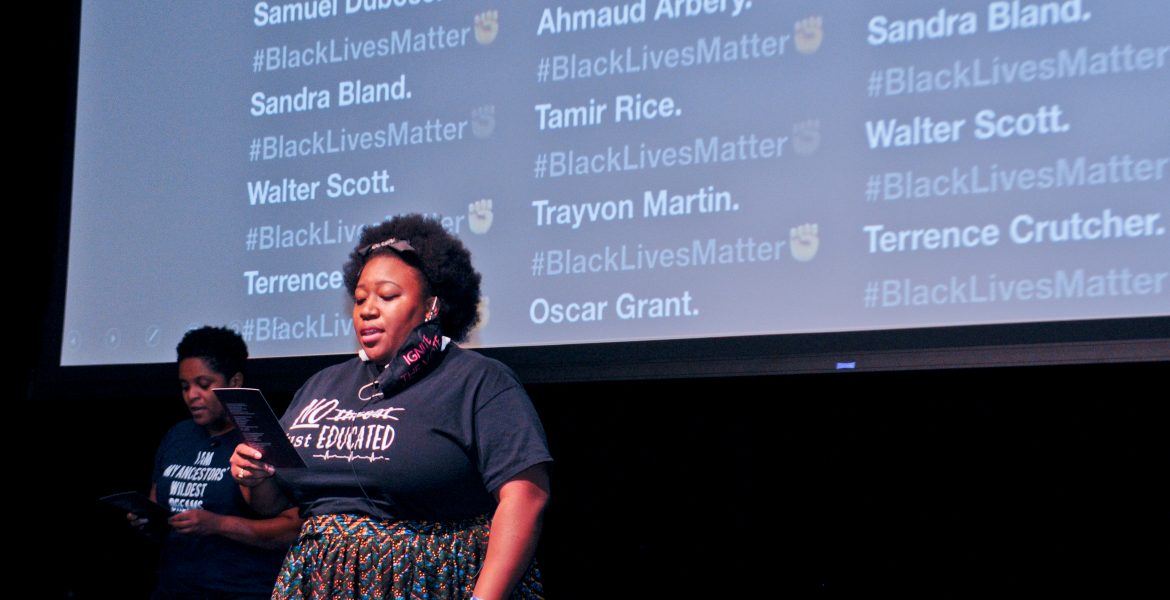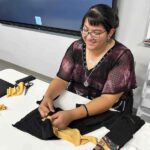Despite setbacks spurred by the coronavirus pandemic, Texas A&M University-San Antonio is entering a new semester stronger than before, said President Cynthia Teniente-Matson Aug. 18 during the semi-virtual fall convocation.
To ensure social distancing, the faculty convocation was broadcast via WebEx and included a performance by A&M-San Antonio’s Mariachi Son de Esperanza, pre-recorded reports from the Staff Council and Faculty Senate, and a live keynote speech from Matson. While some faculty and staff members tuned in from their homes, 48 attended the event live, spread out in the campus auditorium.
“It’ll be years before we fully understand the long-term impacts of COVID-19, but right now, there are disparities that we cannot unsee; we cannot look the other way,” Matson said. “We are in a perfect storm with imperfect solutions.”
The university used funding received through the CARES Act to upgrade classroom and lab technology, providing more opportunities for successful distance learning. Matson shared how the university has worked with the A&M System to rearrange campus, provide the community with free COVID-19 testing and provide students, faculty and staff with resources to relieve accessibility obstacles, like WiFi and online textbooks.
Following a pre-recorded video of faculty and staff members discussing how they navigate new teaching practices, Matson thanked the COVID-19 Risk Management Workforce for developing policies and overseeing the slow return to campus.
Because of the “economic disruption and trickle-down effect of state appropriations,” Matson explained that the university had to return 5% of the $2.38 million share of state funds allocated to the campus for both Fiscal Year 2020 and 2021. By eliminating 65 vacant positions and freezing new hires and travel expenses, the university has been able to make-up for lost funds.
“We know that we are entering a challenging budget year in FY21,” Matson said. “Still, I am confident that barring any further unforeseen disruptions and with a steady enrollment, we have a financial plan that supports no furloughs and no layoffs.”
Recognizing the losses the campus community has faced, Matson remembered the lives of two students who died of the coronavirus. David Alvarado, a senior pursuing his teacher’s certification, died July 23. Robert Wagstaff, a 30-year-old finance senior, died April 10 and was awarded the university’s first posthumous degree.
Before the pandemic shut down the campus, the university was set to break records with new enrollment, Matson said. New applicants increased by 15% and admissions increased by 33%. The university is not yet able to determine how the pandemic impacted these percentages.
Currently, there are 6,714 students enrolled for the fall semester. Despite incoming freshmen being faced with new admission standards, there is no evidence suggesting this deterred new enrollment.
Continuing the work of the ASPIRE program, the university has funded outreach and placement of advisers in K-12 schools throughout the city, Matson said. The university is also opening a charter school in partnership with Edgewood Independent School District through Senate Bill 1882.
“As I look backwards at how we performed in a prolonged crisis, I can say with confidence that our institutional values have guided our actions,” Matson said.
Matson also praised the financial aid and ITS departments for making it possible for undocumented students to electronically apply for state financial aid.
“The electronic process has removed a barrier for some of our most vulnerable students; now their experience is just like that of our other financial aid recipients,” Matson said.
During his virtual report, Faculty Senate President Joseph M. Simpson discussed the senate’s participation in moving the majority of instruction online for the summer and fall semesters. He also shared how the senate is addressing social justice issues.
“The protests following the death of George Floyd served as a moment for us as faculty to be reflective of our role of combating institutional racism,” Simpson said.
In response, the Faculty Senate passed a resolution advocating for a diversity office to be established at the university.
The event concluded with a performance of “Black Summer,” a poem by La-Tieka Sims, former Student Government Association president and A&M-San Antonio graduate. Sims was joined by Jamie Jackson, Zeta Phi Beta sorority campus president and Marissa Galvin, Black Student Union vice-president. The poem focused on the social issues and injustice within the Black community, naming those unjustly killed because of police brutality.
“On our campus, intense focus on racial injustice provided an opportunity for our university to affirm unequivocally that Black lives matter,” Matson said.






